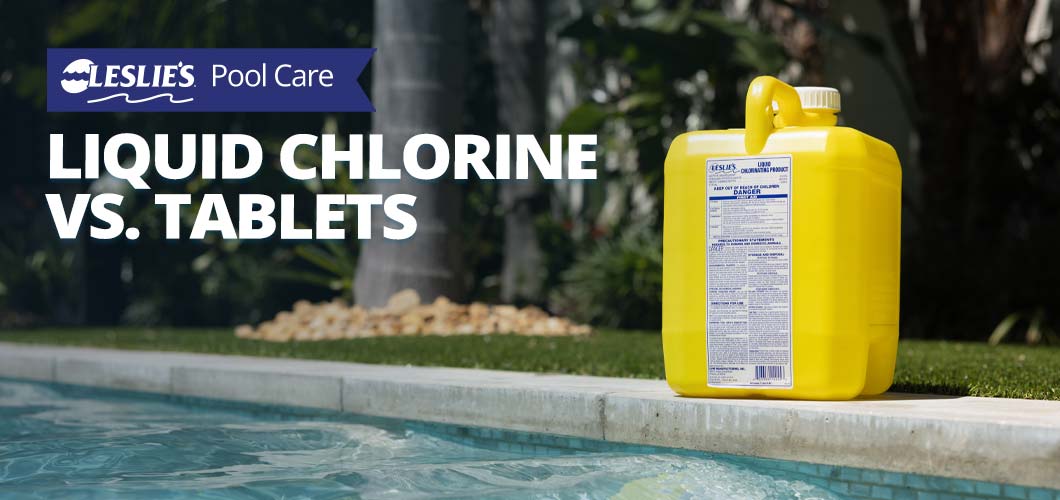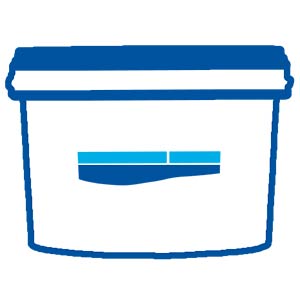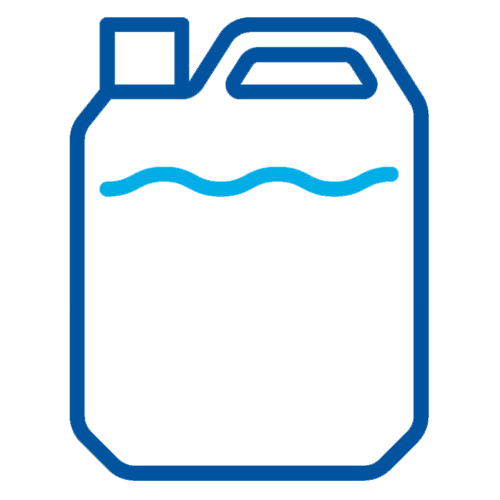
Liquid Chlorine vs. Tablets: Which is Best for Pool Water?
Chlorine is one of the most popular elements used to sanitize a swimming pool. However, there are quite a few variants. If you’re looking for a granular chlorine shock, you might consider using dichlor or cal-hypo. But for your daily sanitization needs, you might use either chlorine tablets or liquid chlorine to keep your pool healthy and ready for swimming. Both liquid chlorine and compressed chlorine tablets can effectively kill bacteria and control algae in your pool. But which one is BEST? Great question! Let’s take a closer look at the ins and outs of chlorine tablets vs. liquid chlorine for sanitizing swimming pools.
Chlorine Tablets
Trichloro-s-triazinetrione (trichlor) tablets are by far the most popular way to sanitize a swimming pool. You can add them to a floating chlorine dispenser, or use them with an inline or offline automatic chlorine feeder. Chlorine tablets are a low-maintenance way to maintain a steady level of Free Available Chlorine between shock treatments, because they consistently deliver chlorine to the pool as the tablets slowly dissolve. All you have to do is make sure your chlorine dispenser is filled with tablets, keep the dispenser setting at an appropriate level, and refill as needed.

Pros of Chlorine Tablets
- Stabilized — no need to add extra Cyanuric Acid to the pool after initial balancing of fresh/start-up pool water
- Highest available chlorine level of any chlorine compound at 90%
- Reliable, consistent levels of Free Available Chlorine
- Easy storage, handling, and application
- Only need to refill the chemical feeder about once a week
- Controls algae and bacteria
- Long shelf life
- Ability to buy a year’s worth of chlorine at once
- Can pick up in store or buy online and have it shipped to your home
Cons of Chlorine Tablets
- Cyanuric Acid levels will build up over time
- Weekly shock treatments with unstabilized chlorine are recommended — tablets cannot be used to quickly raise chlorine levels or superchlorinate a pool
- Adds chlorine to the water slowly
- Low pH level of 2.8–3.0 will decrease pH and Total Alkalinity levels in pool
PRO TIP: Always use a chlorine feeder for your tablets. Contrary to popular belief, you should avoid placing them in the pool skimmer. Doing so can cause a concentrated level of dissolved chlorine to collect in and around the skimmer once the pump shuts off. The resulting high chlorine, low pH water will then move through your pool equipment once the water turns back on. Over time, this can permanently damage your pool equipment. The low pH level can also lead to staining and erosion in and around the skimmer.
Liquid Chlorine
Sodium hypochlorite is a tried and true method for pool sanitization, and it has been used for home disinfection and laundry purposes for many decades. However, it’s worth noting that the pool-grade liquid has a much higher available chlorine content than regular household bleach, and pool-grade liquid chlorine doesn't contain additives that can be detrimental to the water. Its low upfront cost is appealing to many pool owners, but the extra maintenance and shortened shelf life can be a drawback for those seeking a largely hands-off pool care approach.
Because of the way most pool owners add liquid chlorine, the levels of Free Available Chlorine go up dramatically with each application, but dwindle away as time passes. This is because there's no chlorine reserve like you would get with tablets. Without a means of maintaining a steady level of working chlorine, this can leave the pool open for an algae bloom as the chlorine level drops between manual applications. That said, liquid chlorine is a fantastic way to quickly bring up chlorine levels. It’s often the go-to choice for situations where you need immediately available chlorine, such as when shocking the pool, or to quickly boost chlorine levels into the ideal range a few hours before a swim party.

Pros of Liquid Chlorine
- Fast-acting, immediately available chlorine
- Lower purchase cost
- Can be used as either a routine sanitizer or to shock a pool
- Easy to apply — no dilution or pre-dissolving needed
- Goes into solution and disperses quickly, making it ideal for any pool surface, season, or treatment purpose
Cons of Liquid Chlorine
- Lower available chlorine level — around 10–12%
- Unstabilized — Cyanuric Acid must be added separately
- Peaks and valleys of Free Available Chlorine leave the pool vulnerable to an algae bloom
- Requires frequent manual applications or use of a commercial automatic liquid chemical feeder
- Not available for online shipment; in-store pickup only
- Bulk purchases aren’t practical, so you'll make more frequent trips to the store
- Short shelf life of 4–6 weeks; exposure to heat and light can accelerate degradation
- High pH of 13 will increase pH levels in the pool
- Total Dissolved Solids (TDS) levels will build up over time
- Salt is a byproduct of liquid chlorine, and 1 gallon of product in 10,000 gallons of water will increase your TDS reading by about 26–28 ppm
PRO TIP: Looking to reduce your dependency on chlorine and enhance your pool sanitization? Invest in a mineral system! Minerals can reduce chlorine use in your pool by up to 50%, and often allow you to maintain a lower Free Available Chlorine level. These systems operate as a long-acting sanitizer, and can last for months at a time. Because they can help control algae and bacteria between chlorine applications, this makes them especially ideal for users of liquid chlorine. If you're caught in the liquid chlorine vs. tablet debate, just know you can't go wrong with a mineral system to supplement the health of your pool water, no matter which one you choose.
Which is Best for My Pool — Liquid Chlorine or Chlorine Tablets?
Is it better to use chlorine tablets or liquid chlorine in your pool? The decision is totally up to you! Both forms of chlorine offer a unique set of benefits that may make one preferable to the other, depending on your lifestyle and the needs of your pool. In fact, it’s possible to need one or the other — or both — at various times throughout the year.
If you want a reliable, low-maintenance way to keep a steady level of chlorine in the pool, slow-dissolving 3" tablets are the way to go. On the other hand, if you’re looking for a quick way to increase chlorine levels on demand, liquid chlorine might be a better option. With liquid chlorine, if you don’t want to manually add the chemical on a near-daily basis, we'd recommend looking into an automatic liquid chlorine feeder. They’re not as readily available as tablet feeders, and they're most often reserved for commercial operations. However, they'll help reduce the time spent chlorinating your water every week.
If you have more questions about liquid chlorine vs. chlorine tablets, simply call or stop by your local Leslie’s. We can help you figure out which one will work best for your needs. Our industry-leading tabs provide the purest ingredients and highest available chlorine content, and we renew our stock of liquid chlorine often to keep it fresh. No matter which option you choose, you’ll know you’re getting the best possible product for your swimming pool from Leslie's.